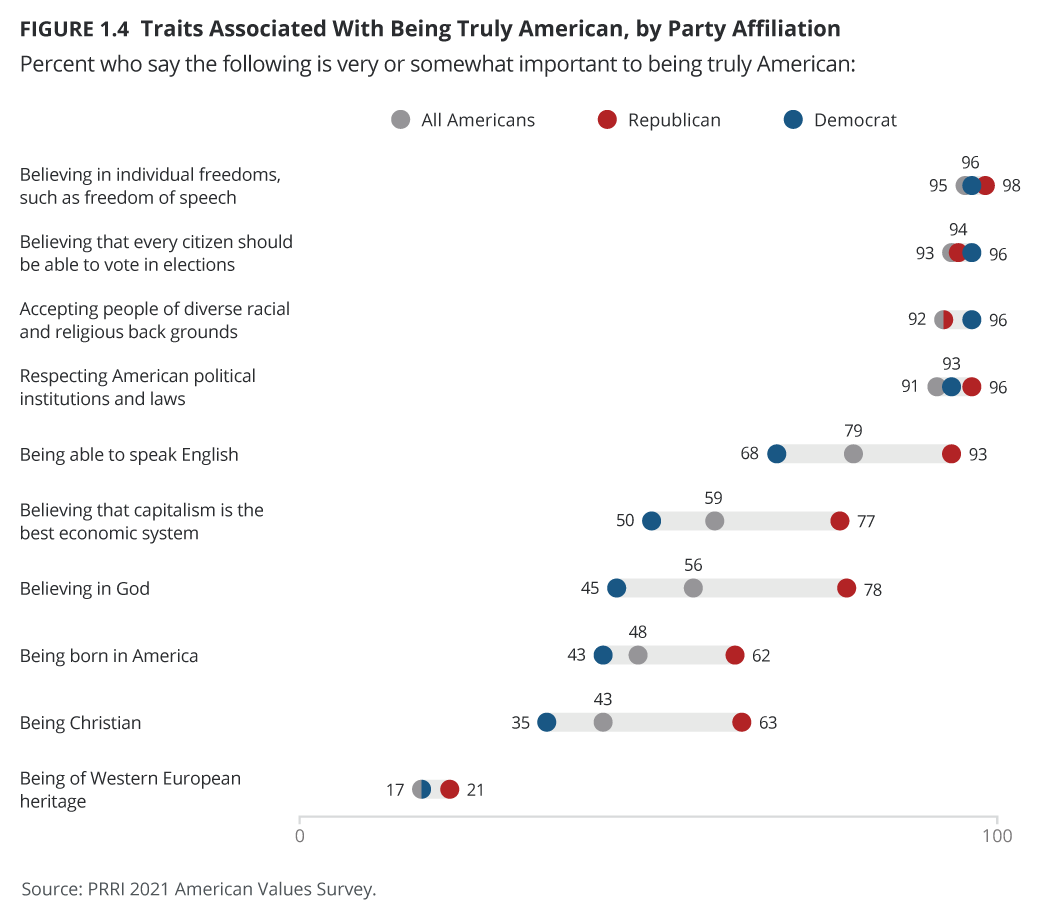Being Truly American
From PRRI:
More than nine in ten Americans say that it is somewhat or very important to being “truly American” to believe in individual freedoms, such as freedom of speech (slightly up from 91% in 2018 to 95% today), to believe that every citizen should be able to vote in elections (93%), to accept people of diverse racial and religious grounds (up from 86% in 2018 to 92% today), and to respect American political institutions and laws (91%). Nearly eight in ten (79%) say it is somewhat or very important to being truly American to be able to speak English.[4] This percentage has gone down consistently, from 89% in 2015 to 83% in 2018 and 79% today.
Fewer Americans, but still a majority, think it is very or somewhat important to being truly American to believe that capitalism is the best economic system (59%) and to believe in God (56%). Thinking a belief in God is important to being truly American declined substantially, from 69% in 2015 to 52% in 2018. Republicans are significantly more likely than Democrats to think that both belief that capitalism is the best economic system (77% and 50%, respectively) and belief in God (78% and 45%, respectively) are important to being truly American. Independents closely mirror all Americans. Most religious groups have similar beliefs, but members of non-Christian religions and religiously unaffiliated Americans are less likely than Christian groups to say that believing capitalism is the best economic system (50% and 44%, respectively) and believing in God (40% and 21%, respectively) are important to being truly American.
Less than half of Americans think being born in America (48%, substantially down from 58% in 2015, but similar to 50% in 2018) is somewhat or very important to being truly American. Most Republicans (62%) say it is important to be born in America, compared to 44% of independents and 43% of Democrats. Majorities of Black Protestants (70%), white evangelical Protestants (58%), and white Catholics (54%) agree that being born in the country is important for being truly American. Other Christians (52%), white mainline (non-evangelical) Protestants (51%), and Hispanic Catholics (49%) are divided over this question. Members of non-Christian religions (39%) and the religiously unaffiliated (33%) are the least likely to think that being born in America is important to being truly American.
Just over four in ten Americans believe that being Christian (43%, substantially down from 53% in 2015 and 39% in 2018) is somewhat or very important to being truly American. Republicans (63%) are more likely than independents (37%) and Democrats (35%) to say that being Christian is important to being truly American. Solid majorities of white evangelical Protestants (76%) and Black Protestants (75%) say that being Christian is important to being truly American. Around half of Hispanic Catholics (52%), white mainline (non-evangelical) Protestants (49%), white Catholics (46%), and other Christians (46%) think the same. Only one in ten religiously unaffiliated Americans (12%) and members of non-Christian religions (9%) say that being Christian is important to being truly American.
Less than one in five Americans (17%) believe that being of Western European heritage is important for being truly American. About one in five or fewer Americans across party and religious affiliations think that Western European heritage is important to being truly American. Republicans (21%) are slightly more likely to say this than independents (15%) and Democrats (17%) are.

